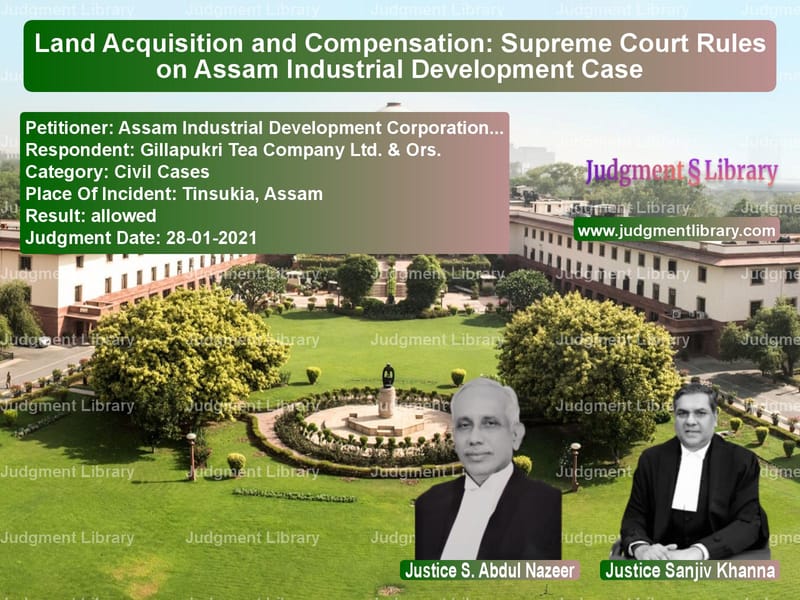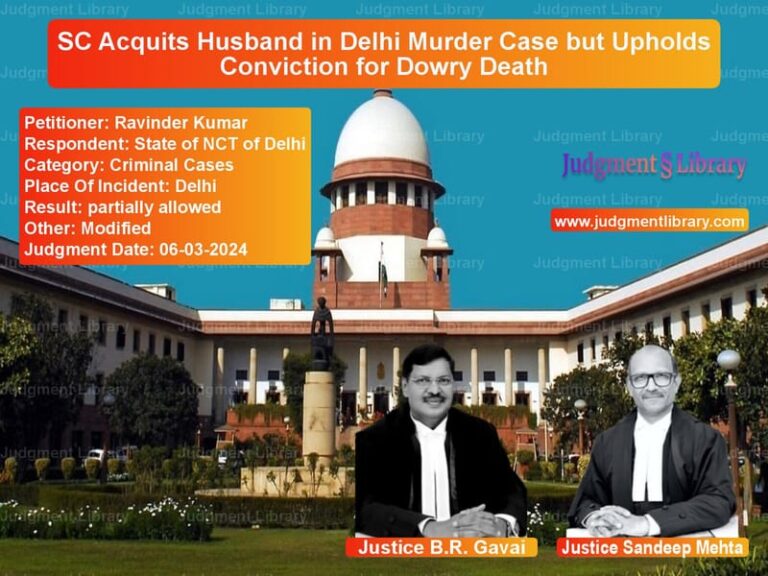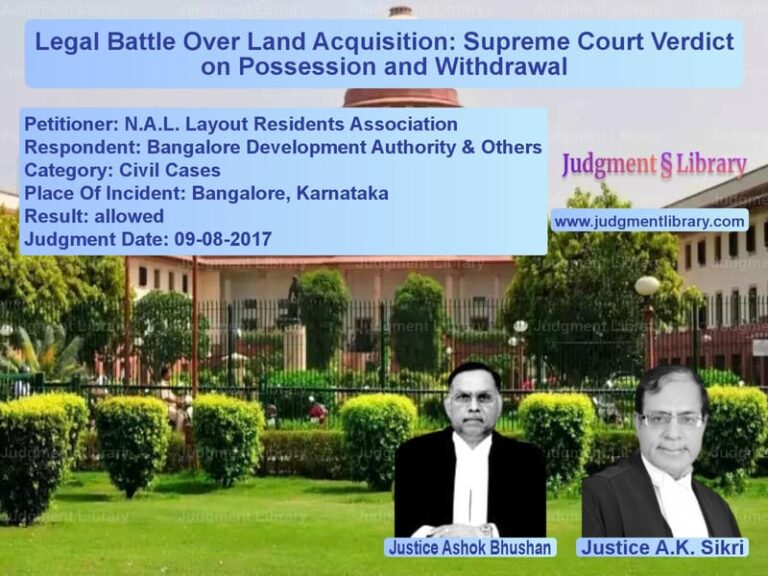Land Acquisition and Compensation: Supreme Court Rules on Assam Industrial Development Case
The Supreme Court of India in Assam Industrial Development Corporation Ltd. vs. Gillapukri Tea Company Ltd. & Ors. addressed a significant issue concerning land acquisition, compensation, and the validity of multiple acquisition proceedings. The case revolved around whether an award for land acquisition had been validly approved in 2010 or if it had lapsed, requiring fresh proceedings under the Right to Fair Compensation and Transparency in Land Acquisition, Rehabilitation and Resettlement Act, 2013. The Court ultimately ruled in favor of the appellant, setting aside the decision of the Guwahati High Court.
Background of the Case
The dispute arose when the Government of Assam sought to acquire a portion of land from Gillapukri Tea Estate in Tinsukia, Assam, for the development of a plastic park. The acquisition process was initiated under the Land Acquisition Act, 1894, with a notification under Section 4 published on August 8, 2008, and a declaration under Section 6 issued on June 17, 2009. Assam Industrial Development Corporation Ltd. (AIDC) was appointed as the nodal agency for the acquisition.
The core issue in the case was whether the acquisition proceedings had been completed in time, particularly whether an award had been approved by the State Government on March 5, 2010. If the award was not validly approved, the acquisition proceedings would lapse, requiring fresh proceedings under the 2013 Act, which provides for enhanced compensation.
Key Legal Issues Addressed
1. Validity of Land Acquisition Award
The respondents argued that the letter dated March 5, 2010, only approved the land acquisition estimate and not the award itself. They contended that due to the failure to approve the award within the prescribed two-year period, the acquisition had lapsed, necessitating fresh proceedings.
However, the Supreme Court rejected this argument, noting that:
“This letter dated 05.03.2010 was issued in response to the letter dated 30.01.2010, whereunder approval of the award and the land acquisition estimate was sought.”
The Court emphasized that both the estimate and the award had been sent for approval together and that the subsequent conduct of the parties confirmed that the award was indeed approved.
2. Conduct of the Parties and Acceptance of Compensation
The Court further noted that the respondents had accepted compensation and sought enhancement of the same under Section 18 of the Land Acquisition Act, 1894. The first respondent had acknowledged receiving a sum of Rs. 4.95 crores as compensation in April 2010, and possession of the land had been transferred to the acquiring authority.
Read also: https://judgmentlibrary.com/supreme-court-grants-interest-on-solatium-in-land-acquisition-case/
The Court observed:
“Not only did the first respondent receive compensation pursuant to the award, but it in fact sought enhancement of the same vide its reassessment petition dated 05.05.2010.”
3. Effect of the 2013 Act on the Acquisition
The first respondent claimed that fresh acquisition proceedings initiated in 2012 should be governed by the 2013 Act, entitling them to enhanced compensation. However, the Supreme Court held that once the land had been acquired and vested with the State Government, fresh acquisition proceedings for the same land were impermissible.
The Court relied on precedent, stating:
“Once the award has been approved, compensation has been paid, and possession of the land has been handed over to the Government, acquisition proceedings could not have been reopened.”
Findings of the Court
1. Award Was Validly Approved
The Court held that the letter dated March 5, 2010, constituted a valid approval of the award. This was confirmed by the subsequent actions of the parties, including the payment and receipt of compensation and the transfer of possession.
2. Land Had Already Been Acquired
The Court ruled that once possession had been taken by the State and compensation had been paid, the land was vested with the government, making fresh acquisition proceedings unnecessary.
3. Fresh Acquisition Proceedings Were Invalid
The Court rejected the validity of fresh acquisition proceedings initiated in 2012, stating:
“Once the land stood vested in the State, it could not have been acquired again. Any issuance of fresh notification under Section 4 and 6 or even preparing of a fresh award by the State Government in respect of the first respondent’s land will be non est or infructuous.”
Supreme Court’s Verdict
The Supreme Court allowed the appeal and set aside the judgment of the Guwahati High Court. The key conclusions were:
- The award dated March 5, 2010, was validly approved.
- Possession of the land had been taken and compensation had been paid.
- The first respondent’s argument that the award had lapsed was without merit.
- Fresh acquisition proceedings initiated in 2012 were invalid.
Conclusion
This ruling reaffirms key principles in land acquisition law:
- Once an award is approved, compensation is paid, and possession is transferred, the acquisition process is complete.
- Fresh acquisition proceedings cannot be initiated for land already vested with the State.
- Claims for enhanced compensation under the 2013 Act do not apply if the acquisition was completed under the 1894 Act.
The judgment provides clarity on the interplay between the Land Acquisition Act, 1894, and the Right to Fair Compensation and Transparency in Land Acquisition, Rehabilitation and Resettlement Act, 2013, ensuring that landowners cannot misuse procedural gaps to seek undue benefits.
Petitioner Name: Assam Industrial Development Corporation Ltd..Respondent Name: Gillapukri Tea Company Ltd. & Ors..Judgment By: Justice S. Abdul Nazeer, Justice Sanjiv Khanna.Place Of Incident: Tinsukia, Assam.Judgment Date: 28-01-2021.
Don’t miss out on the full details! Download the complete judgment in PDF format below and gain valuable insights instantly!
Download Judgment: assam-industrial-dev-vs-gillapukri-tea-compa-supreme-court-of-india-judgment-dated-28-01-2021.pdf
Directly Download Judgment: Directly download this Judgment
See all petitions in Property Disputes
See all petitions in Damages and Compensation
See all petitions in Judgment by S. Abdul Nazeer
See all petitions in Judgment by Sanjiv Khanna
See all petitions in allowed
See all petitions in supreme court of India judgments January 2021
See all petitions in 2021 judgments
See all posts in Civil Cases Category
See all allowed petitions in Civil Cases Category
See all Dismissed petitions in Civil Cases Category
See all partially allowed petitions in Civil Cases Category







